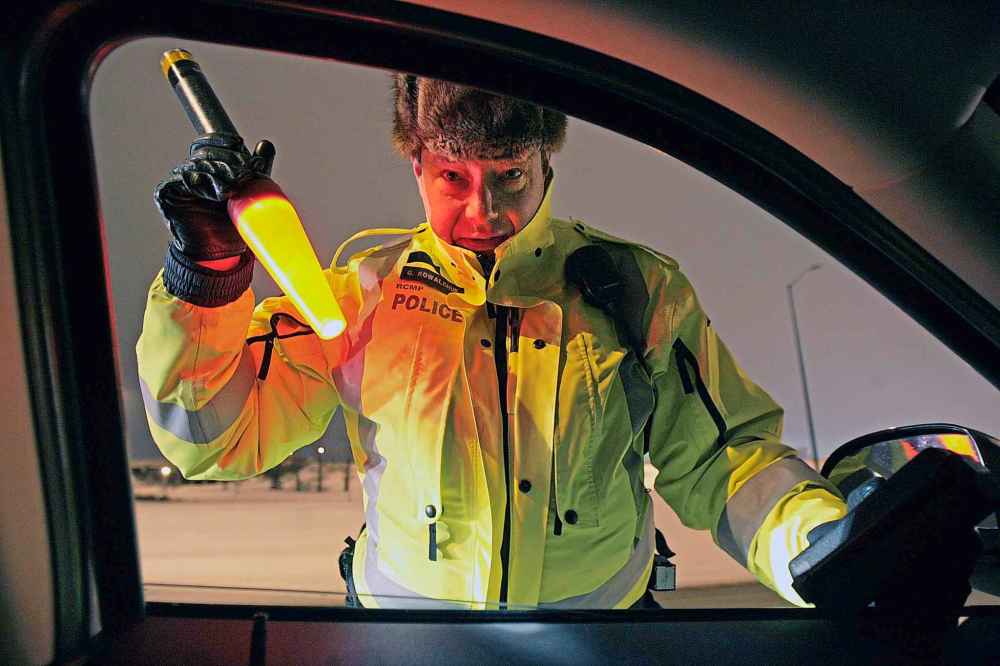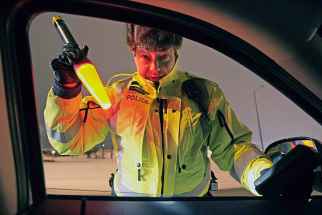Police confident new law will take more drunks off road
Read this article for free:
or
Already have an account? Log in here »
To continue reading, please subscribe:
Monthly Digital Subscription
$0 for the first 4 weeks*
- Enjoy unlimited reading on winnipegfreepress.com
- Read the E-Edition, our digital replica newspaper
- Access News Break, our award-winning app
- Play interactive puzzles
*No charge for 4 weeks then price increases to the regular rate of $19.00 plus GST every four weeks. Offer available to new and qualified returning subscribers only. Cancel any time.
Monthly Digital Subscription
$4.75/week*
- Enjoy unlimited reading on winnipegfreepress.com
- Read the E-Edition, our digital replica newspaper
- Access News Break, our award-winning app
- Play interactive puzzles
*Billed as $19 plus GST every four weeks. Cancel any time.
To continue reading, please subscribe:
Add Free Press access to your Brandon Sun subscription for only an additional
$1 for the first 4 weeks*
*Your next subscription payment will increase by $1.00 and you will be charged $16.99 plus GST for four weeks. After four weeks, your payment will increase to $23.99 plus GST every four weeks.
Read unlimited articles for free today:
or
Already have an account? Log in here »
Hey there, time traveller!
This article was published 19/12/2018 (2554 days ago), so information in it may no longer be current.
Rebecca Dahl was was directed into a Winnipeg Police Service checkstop Tuesday night while driving over the Disraeli Bridge on her way home from work.
An officer asked where the 24 year old was travelling from and whether she’d had any alcohol to drink. She hadn’t, so it wasn’t long before she was on her way.
Based on their brief conversation and Dahl’s behaviour, there was no apparent reason to test for alcohol in her blood. But a new impaired-driving law rolled out across Canada Tuesday gives police the power to demand a breath sample, even if officers have no reason to suspect alcohol use.

“(Previously), an officer would have to have reasonable suspicion,” said Sgt. Mark Hume, the unit commander for the RCMP’s Manitoba West Traffic Services. “As of (Tuesday), that reasonable suspicion isn’t necessary.”
Officers, Hume said, already have the freedom to pull over drivers for a variety of reasons, including licence and registration checks and vehicle safety issues.
“We already have the authority to pull them over to check their sobriety,” he said. “This just gives us one more tool.”
WPS impaired driving countermeasures co-ordinator Const. Stephane Fontaine said officers now have the opportunity to test more drivers, some of whom might have been waved through despite having consumed alcohol because they weren’t showing obvious signs of intoxication.
“As far as I understand, in our continuous fight against impaired driving, they wanted to make it simpler for officers to do their job,” Fontaine said.
But while the overall goals — increased road safety and fewer impaired-driving injuries and fatalities — of the new law might be noble, the means by which they’re being pursued raises concerns over potential abuse of power by police, as well as infringement on rights, said Winnipeg defence lawyer Sarah Inness.
“The concern that I have is that now police have the power to compel any driver without any grounds whatsoever to provide a breath sample, detaining them without grounds and presenting a sample that might incriminate themselves,” Inness said. “There’s a potential for arbitrary or discriminatory application of their demands, and I think that is troubling.”
Inness said the Supreme Court of Canada ruled in 2005 that police can administer sobriety tests on drivers who don’t have access to counsel, a Charter right. In that case, the court decided the infringement on the right to counsel was justified given the importance of “detecting and deterring drunk driving.”
‘There’s a potential for arbitrary or discriminatory application of their demands, and I think that is troubling’
– Winnipeg defence lawyer Sarah Inness
But Inness said the door might be open now to a challenge over breaching the right to counsel because police no longer need grounds to demand a breath sample.
Mothers Against Drunk Driving Canada legal counsel Eric Dumschat expects challenges to the new laws.
“But we are confident that they will be upheld as constitutional when it eventually reaches the Supreme Court,” he said.
Under the previous law, Dumschat says, police “under no fault of their own” fail to apprehend about half of the drivers at or above the legal limit when relying on methods such as smelling alcohol on a driver’s breath or through general conversation at checkstops.
“(The new law) takes away the subjective element and implements objective scientific tests.”

Dumschat points to other countries, such as Australia, which have seen significant reductions in impaired-driving fatalities since the implementation of similar laws. “Currently, about 1,000 Canadians die in impaired-driving incidents, and about 60,000 are injured each year,” he said.
Hume said, so far this year, 81 people have died on Manitoba roads policed by the RCMP, and about half of them are attributable to alcohol impairment. He expects the law will result in more arrests and fewer fatalities.
Yet, with that in mind, Inness is concerned that officers with racial or ethnic biases will unfairly target certain groups.
“In other circumstances where racial profiling or unethical targeting is done, the basis for why officers did what they did can be questioned and police can be called on to explain,” she said. “In these cases, because grounds aren’t required, there’s no real way to determine why one person was stopped and not another.”
Hume said he doesn’t think that any group of people will be treated differently than others on the basis of race, ethnicity or other traits.
“Our directions and teachings are not to target anyone unfairly or differently,” he said.
Inness remains concerned.
“I see this as there really not being a check and balance on the potential misuse of police power, whereby an officer could apply that power in a discriminatory or arbitrary manner and never be held to account,” she said.
For her part, Dahl has no problem with the new law and didn’t mind being stopped.
“I don’t drive drunk, and I think it’s good if it will deter people from drinking and driving,” she said.

Ben Waldman covers a little bit of everything for the Free Press.
Our newsroom depends on a growing audience of readers to power our journalism. If you are not a paid reader, please consider becoming a subscriber.
Our newsroom depends on its audience of readers to power our journalism. Thank you for your support.









